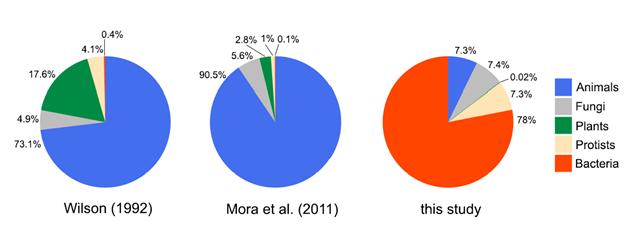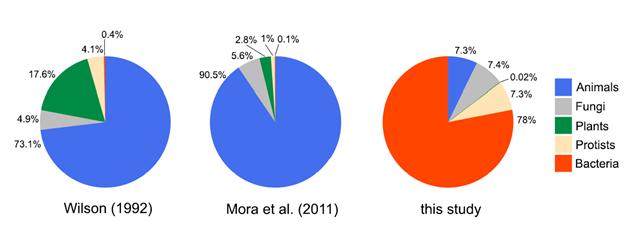
Credit: Brendan B. Larsen, Elizabeth C. Miller, Matthew K. Rhodes, and John J. Wiens
Anyone who has studied biology, watched a nature documentary, or, for that matter, simply enjoyed time in the outdoors, has likely been amazed by the variety of plant and animal life on our planet.
To date, about 1.5 million species have been formally described in the scientific literature, most of them insects. Proportionally, bacteria comprise less than 1% of all described species.
Scientists generally agree that many more species exist than are formally described, but they disagree about how many there really are. Some studies have estimated 2 million or fewer, whereas others suggest as many as 12 million (one recent study even suggested the planet could be home to a trillion species).
In a new paper published in The Quarterly Review of Biology (September 2017), researchers from the University of Arizona have estimated that there are roughly 2 billion living species on Earth, over a thousand times more than the current number of described species.
In coming up with their estimate, the researchers took advantage of the fact that many estimates now agree on the projected number of insect species, around 6.8 million. They incorporated new estimates of species boundaries revealed by DNA sequences, which suggest there might be six times as many insect species, increasing the total to 40 million for insect species alone.
They then reviewed all groups of organisms associated with insects as parasites or symbionts. They found that each insect species most likely hosts a unique species of mite, roundworm (nematode), a one-celled fungus called a microsporidian, and a one-celled organism called an apicomplexan protist (which cause malaria in humans).
Most importantly, the researchers estimated that each insect species is likely to host at least 10 bacterial species found nowhere else. Based on these estimates, they deduce that there should be around 2 billion species on Earth.
The authors also suggest that the diagram of which taxonomic groups contain the most species, or the "Pie of Life," is very different from traditional estimates. Rather than being dominated by insects, as traditionally shown, their estimates show a pie dominated by bacteria (70 to 90% of all species), with insects (and animals in general) having a much smaller slice.
###
The premier review journal in biology, The Quarterly Review of Biology has presented insightful historical, philosophical, and technical treatments of important biological topics since 1926. The QRB publishes outstanding review articles of generous length that are guided by an expansive, inclusive, and often humanistic understanding of biology. Beyond the core biological sciences, the QRB is also an important review journal for scholars in related areas, which include policy studies and the history and philosophy of science. A comprehensive section of reviews on new biological books provides educators and researchers alike with information on the latest publications in the life sciences.
Media Contact
John Wiens
[email protected]
@ChicagoJournals
http://www.journals.uchicago.edu
Original Source
http://www.journals.uchicago.edu/journals/qrb/pr/170803 http://dx.doi.org/10.1086/693564





